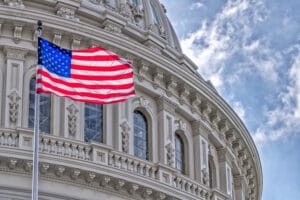Government spends $100 million on aborted baby parts
The Trump administration has begun taking steps to stop the purchasing of aborted baby body parts with federal tax dollars. The National Institute of Health, under the Department of Health and Human Services (HHS), has given about $100 million in tax dollars to scientists using aborted baby parts in their research. Some were from healthy, late-term babies as late as 24 weeks of pregnancy. The contract with Advanced Biosciences Resources, the company exposed in David Daleiden’s undercover videos with Planned Parenthood, has been canceled, but the practice continues.
In September, 48 national and state pro-life leaders urged HHS Secretary Alex Azar to end the federal government’s use of aborted fetal tissue for research and, instead, turn to ethical alternatives. HHS assistant secretary Brett Giroir says the department, which oversees the projects, is “fully committed to prioritizing, expanding, and accelerating efforts to develop and implement the use of these alternatives.”
HHS has organized meetings with a range of groups, including pro-life groups, ethicists, and scientists to discuss the future of this taxpayer-funded research. The administration has directed HHS to conduct an audit of all acquisitions involving human fetal tissue to “ensure conformity with procurement and human fetal tissue research laws and regulations” and said it would review alternatives to “ensure that efforts to develop such alternatives are funded and accelerated.” [Lifenews.com, 11/14/2018; 10/17/2018; 9/26/2018]
Cord blood stem cells successful
For the first time, doctors in Bogota, Columbia have used stem cells harvested from umbilical cord blood to successfully repair an infant’s cleft palate. This success will result in better treatment options for children born with this birth defect and it does not require killing human embryos. In a study published in the Journal of Craniofacial Surgery on November 1, 2018, researchers isolated the stem cells, froze them for later use, and then injected them into a soft pocket of tissue. Follow-up studies showed that new bone grew and closed the cleft. By age 5, the child showed normal jaw bone thickness. Umbilical cord blood stem cells can grow into almost any type of cell and have been used in other medical studies to regrow or heal tissues. They are easy to collect and pose no risk to the baby or mother.
A cleft palate causes breathing problems, feeding difficulties, speech impediments, hearing impairment, and dental abnormalities. Approximately 2,700 children with this birth defect are born in the U.S. each year. Correction routinely requires three surgeries. [www.world.wng.org, 10/12/2018]
Planned Parenthood names new president
The nation’s largest abortion business, which aborts approximately 320,000 unborn babies every year, has named a new president, Leana Wen, to replace retiring CEO Cecile Richards. Wen who cites the organization’s “life-saving work,” is well-known for her abortion advocacy. As Baltimore’s health commissioner, she attempted to force pro-life pregnancy centers to promote abortions.
Wen maintains women have a “fundamental human right” to abort their unborn babies. A former emergency room doctor, Wen becomes the first physician to lead Planned Parenthood in almost 50 years. On the September 13, 2018 episode of The View, Wen talked about watching a woman die after a botched abortion, which she blamed on a lack of “access to health care.”
Carol Tobias, president of National Right to Life, believes, “No doubt Leana Wen will seek to continue promoting and expanding Planned Parenthood’s abortion empire.” [Lifenews.com, 9/17/2018; www.world.wng.org/ 9/17/2018]
Gosnell film changes hearts
“Gosnell: The Trial of America’s Biggest Serial Killer” premiered in early October. The film recounts the true story of Kermit Gosnell, a Philadelphia abortionist convicted in 2013 on three counts of murdering newborn babies. His “house of horrors” abortion facility went without inspection for 16 years. He is serving three consecutive life terms in prison. Staff members say they saw newborn babies move, breathe, and cry before Gosnell snipped their spinal cords with scissors. Authorities believe Gosnell may have killed hundreds of babies this way.
The movie placed in the top 10 movies on its first weekend and was the most popular independent film in the U.S. It was largely ignored by the media, so the number of theaters showing the film dropped off. Facebook and NPR refused to run ads for the film, yet the film broke a crowdfunding record on Indiegogo. As of October 28, the film had taken in $3.2 million.
The film caused serious reflection about abortion among viewers. Kathy Zhu, a college student, saw the film and tweeted, “Yesterday, I was pro-choice. I believed that women should have a say & the gov shouldn’t be interfering w/our lives. Today, I’m pro-life. After watching #Gosnell & doing in-depth research, I finally understand the horrors of loopholes in late term abortions. Pls go watch Gosnell!” Entrepreneur and writer Patrick Courrielche said the film “singlehandedly” changed his mind about abortion. Missouri attorney said the film “shattered my sheltered agnosticism over abortion.” [For information about the film, visit www.gosnellmovie.com]
Abortion contributes to mental health problems
A comprehensive review of more than 200 studies shows agreement over the fact that abortion may trigger or worsen mental health problems according to David Reardon, director of the Elliot Institute and author of the review published in Sage Open Medicine (Vol 6:1-38, 2018). There is disagreement, however, among what Reardon describes as abortion and mental health (AMH) proponents and minimalists. AMH proponents interpret data in ways that stress the need for better screening and counseling of women seeking abortions; AHM minimalists oppose any change in abortion services as unnecessarily burdensome on women’s “right to choose.”
Researchers on both sides of the debate agree on 12 findings including: abortion contributes to mental health problems in some women; there is insufficient evidence to prove that abortion is the sole cause of higher rates of mental illness associated with abortion; the majority of women do not have mental illness following abortion; a significant minority of women do have mental illness following abortion; there is no evidence that abortion can resolve or improve mental health; and, risk factors exist that identify women at higher risk.
A group of abortion-supporting psychologists wrote the Report of the American Psychological Association Task Force on Mental Health and Abortion in 2008. The group acknowledged that “it is clear that some women do experience sadness, grief, and feelings of loss following termination of a pregnancy, and some experience clinically significant disorders, including depression and anxiety.” They identified 15 risk factors which can be used to identify women who are at greater risk of psychological problems after an abortion. These include: terminating a pregnancy that is wanted or meaningful; perceived pressure from others to terminate a pregnancy; perceived opposition to the abortion from partners, family, and/or friends, lack of perceived social support from others; low self-esteem; and, low perceived control.
Reardon says, “The evidence is clear: some women do experience abortion as a trauma. The prevalence rates and preexisting risk factors may continue to be disputed, but the fact that abortion contributes to PTSD symptoms in at least a small number of women is a settled issue.” He recommends that researchers with mixed views on abortion design a national study to research this important issue. [Lifenews.com, 11/2/2018]
Trump rules address abortion funding under Obamacare
In November, the Trump administration issued a new rule designed to protect Americans from being forced to pay for abortions under Obamacare. This proposed Department of Health and Human Services rule ensures that, for the first time in years, no religious group, nonprofit, small business, or other employers with moral objections will have to cover pills they believe destroy a human life. The White House is also making sure that Americans are fully informed about any abortion coverage in their health care plans. Now, insurers will have to send Obamacare customers a separate bill explaining how much of their money is being spent on abortion.
National Right to Life President Carol Tobias said, “We applaud President Trump and his administration for enforcing the law and seeking to uphold the principles of the Hyde Amendment to prevent the use of tax dollars to pay for abortion coverage.” NRLC legislative director Jennifer Popik, J.D. added, “While only comprehensive legislative reform can cure the multiple abortion-expanding components of Obamacare, today’s proposed rule from the Trump administration sends a strong message that the federal government ought to get out of the business of paying for abortion until Obamacare can be replaced.”
The rule will likely result in a clash with states like California and Oregon, which require all insurers to cover abortions. [Lifenews.com, 11/7/2018, 11/8/2018]





